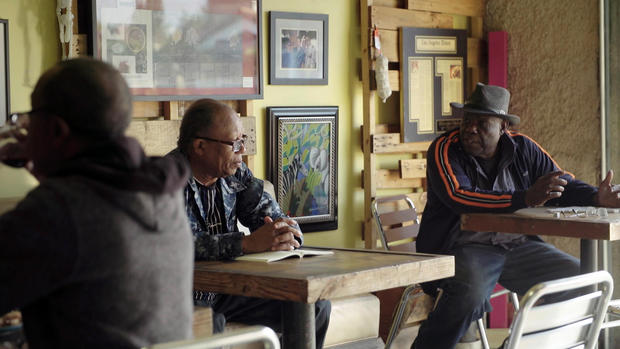REVERB is a new documentary series from CBSN Originals. Watch the latest episode, “Rising Tide: Priced Out in Miami,” in the video player above.
Louis Rosemont called Miami’s Little Haiti neighborhood home for almost 40 years. He was part of one of the first waves of immigrants to build the community after fleeing a violent dictatorship in his homeland. But he has recently found himself exiled again — priced out of his home by rising rents as climate change rearranges the Miami real estate market.
Little Haiti is a historically low-income neighborhood that sits inland, on land at double the elevation of wealthier neighborhoods along the beachfront. In Miami, a city often considered ground zero for the impacts of climate change, sea level rise and frequent flooding are threatening the homes of more affluent residents near the beach. As a result, well-off families are increasingly opting to move to higher ground, and developers are encroaching on low-income and immigrant communities farther inland to meet the need. That’s driving up rents, making the neighborhoods unaffordable to those who’ve lived there for years.
“Here in Miami, they put wealthy communities on the outskirts [of the city] so they can enjoy the beach,” explains Valencia Gunder, a Miami native and founder of the nonprofit The Smile Trust, which helps the homeless. “Because of sea level rise and climate change, we know that Miami is expecting up to six feet of water, and now we’re starting to see these wealthy communities start to come to the center of the city. The center of the city is where most of the under-served communities of color are housed.”
The phenomenon is known as climate gentrification, and its impact is deeply felt in Miami’s immigrant populations. Many, like Louis Rosemont, settled here seeking stability and safety, but are now finding their stability threatened once again.
“Like some of our brothers and sisters in Haiti, Puerto Rico and some of the Caribbean islands, they moved to this city seeking refuge after losing everything,” said Gunder. “And then you also have the fact that people prey on individuals during these times. And it’s been common knowledge in Miami for many years, before the term ‘climate gentrification’ was even known, that communities like Liberty City, Little Haiti and Overtown were always very vulnerable because of that situation.”
The land Rosemont’s apartment sat on in Little Haiti grew more desirable as the amount of developable land in Miami diminished and the waters crept up the coast. In the summer of 2018, his landlord sent a notice to him and the other tenants, giving them 30 days to move out so the building could be demolished. It’s now an empty lot.
“So when we going to the city to explain the situation, the people representing the city come sitting down and they say, well, we want you move away to the shelter,” he recalled. “I say, ‘I’m not [going] to the shelter. I pay my rent. The shelter is for homeless, I’m not homeless.’ The situation was really, really sad in the building that I was living … it’s the people disabled, the old people in retirement living there…”
But developers are already moving in. In June 2019, a real estate development group received approval to build a billion-dollar luxury residential and commercial complex in the heart of Little Haiti called the Magic City Innovation District. CBSN Originals’ Adam Yamaguchi walked through part of the new development with co-founder Tony Cho.
“So welcome to BaseCamp, Little Haiti at the Magic City Innovation District,” said Cho. “This is our immersive art park that’s open Thursday through Sunday, open to the community, no charge. We have food trucks, we have vendors here, we have a stage for live music, we’ve got immersive art sculptures here.”
The land BaseCamp was built on was previously occupied by a mobile home park that housed 40 working class families. But Cho said he doesn’t agree that Magic City Innovation District has caused the gentrification.
“I don’t think it’s true. As I said before, our mission is to bring people in and for us to be a source of pride within the community and to really celebrate Little Haiti,” he said. “And the truth is, a lot of the residents were moving out even before I came into this community. … There haven’t been any new buildings built here. So I think, again, what our mission is is to revitalize in a very responsible, inclusive, regenerative way. So I think we have the opportunity to help actually do the opposite and do something really positive for this community.”
As more low-income residents move out and wealthier residents move in to areas like this across the country, some community organizations and activists are coming up with initiatives to try to fight it. But for Gunder, it’s hard to stay optimistic.
“We’ve been able to bring a lot of awareness to this thing, because if you go back to 2015, nobody knew what climate gentrification was,” she said. “It’s a very new term, very new research, and we are grateful that people are starting to bring a lot of awareness to it.”
“But,” she added, “it’s happening so rapidly. It’s almost like you can’t stop it.”



